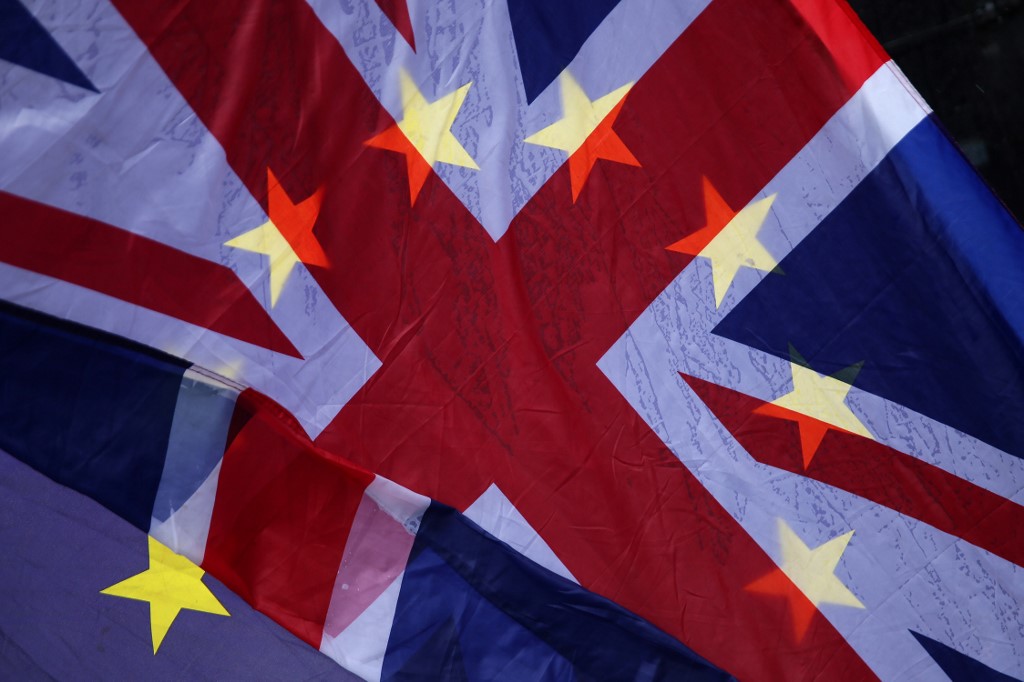
Bremainers Ask ……. Ben Chambers
Ben Chambers is a musician, arranger and producer and is the voice behind the popular Pro-EU Radio Show and Podcast ‘SMR’ (Single Minded Rejoiners ).
Susan Scarrott : You’ve had some amazing special guests on SMR over the years. Is there anyone you are still longing to interview?
Hey, Susan – great question and one which I often end up asking myself! You’re right, some truly exceptional people have agreed to let me quiz them: Sir Tony Robinson, Ken Loach, Anna Soubry among others – but there are still so many people I’d love to talk to.
The list changes regularly, often according to news events and who I feel might have something worthwhile to say about them, but my Top 5 right now would be as follows:
Actor Eddie Marsan, who always speaks so thoughtfully on topics such as diversity, background and immigration; Armando Iannucci (the writer, director and satirist); former Liverpool Manager Jurgen Klopp about how to maintain principles in the face of vehement opposition; ‘Dragon’s Den’ legend Deborah Meaden, because I just love everything about her, and Ursula von der Leyen – I’d ask her all about the prospect of a fast track back! And right now, she’s the one to ask!
Steven Wilson : What, if anything, do you think Keir Starmer has done well, and what have been his worst mistakes?
I totally get why you’re asking that one, Steven! Disappointment runs deep with Labour right now, but perhaps my hopes were too high, eh? I think it’s important to remember, the contrast between the organized crime syndicate of the Tories and what we have now can’t be overstated – the vast majority of the Labour front bench and certainly their MPs are decent, principled people who care… and that’s a great starting point really, isn’t it?
But you’re right (I’m guessing from the “if anything” that you’re not exactly impressed!) Labour appears to have forgotten its root and branch principles and the reason it was elected, not to mention those in the Cabinet who previously held such passionate views on Brexit and Europe suddenly having so little to say (David Lammy? Whatever happened to him?). But aside from his refusal to fess up and face the Brexit music by reversing it pronto, Starmer’s obvious missteps thus far have to be the Winter Fuel Debacle, the optics over Benefit Reform and his obvious kowtowing to the multimillionaire press barons who “allowed him” to win the election!
But there is hope! Votes for 16- and 17-year-olds is a manifesto commitment I applaud heartily, provided (as I mentioned on last week’s show) substantial education reform takes place to prepare our young people for their new responsibility!
Lisa Burton : Which politician do you admire the most and which do you loathe the most?
Seriously, Lisa? You want me to whittle that list down to just one of each? Near impossible! But since it’s you – I’ll do my best…
But before I do, some honourable mentions: Anna Soubry (despite her Tory “ethics” on a number of issues) always impressed me with her straight talking, no nonsense approach to Brexit and still does to this day – but she’s no longer an MP, so I guess she doesn’t count!
I have tremendous respect for a number of former Tories who stuck to their guns over Brexit and were ejected from the party by Johnson in 2019, but again – they’re no longer serving.
So, right now, I’d have to say Lib Dem, Daisy Cooper. In my view, she’s a model MP. She publishes weekly a diary of how she’s spent each day, is principled, clear and able to take on anyone in a debate since she’s prepared to actually do her homework and know her stuff! Few others come anywhere near, but I also like Zack Polanski right now too!
As for the worst? Do you REALLY have to ask? It would have been a toss-up between Lee “30p” Anderson and some still serving vile Tory detritus like Robert Jenrick – but now the Nicotine-Stained Man Frog and Bollock Brained Foghorn of Ignorance has finally slithered into the Commons – there’s simply no competition!
I hate very few people. He’s one of them.
David Eldridge : Why do you think Farage’s Reform UK is so popular at the moment? Do you think they can keep it up till the next election?
Do you want me to be honest, David? I’m guessing you do…
Well, it’s no mystery really. Farage is adept at getting the hard of thinking onto the same page and dancing to his tune. In fact, he’s bloody good at it and right now, no-one does it better!
Promise big (forget about workable policy!), tell them EXACTLY what they want to hear and then bugger off down the pub to laugh at how stupid they all are with his multi-millionaire mates!
By tapping into what he knows are easily exploitable fissures in the public’s deep-rooted nationalistic tendencies, he expertly manipulates first the facts (into downright lies!) and then his base into fearing, then hating minority groups who pose them no threat whatsoever.
This both distracts from the REAL enemy (billionaires!) and helps cement his “cult of the ill-informed” (idiots?) who will follow him anywhere but off the cliff…
…which is a crying shame, isn’t it?
As for their chances in 2029? Who’s to tell? But Femi is right to take the threat seriously, as should we all – everything we can do to debunk his lies is 100% worthwhile! More power to the wonderful army of TikTok rebels who do it daily!
Valerie Chaplin : After one year in office, what advice would you give the Prime Minister?
Crikey, I’d love a chance to sit down with him, armed with a laptop and all the footage of him demonstrating his former principles! I’d make him squirm… or maybe I wouldn’t!
In his defence, I think being in Government means compromise to some extent and there will be things he has discovered that he genuinely didn’t know when in opposition. Plus, it’s easy to over-promise in an election campaign, they all do!
What’s harder to defend is his apparent void of understanding over how much damage Brexit is doing to the country, our reputation, trade, the economy, families – you name it!
I’d remind him that, when he took office, he promised to put “country before party” – what happened to that one? Rejoining the EU would fix 80% of our woes in one fell swoop and most of the population supports it – so what’s the REAL issue here?
I’d ask him to consult more widely before taking whatever daft advice his inner circle dream up! And I’d ask him to check his conscience before recycling the kind of rhetoric that came out of his mouth re: “island of strangers!”
Seriously, did no-one even think to check that?
Helen Johnston : As a long-standing campaigner what, if anything, do you think the anti-Brexit campaign could have done differently and what else can we do now?
Aha! The Billion Dollar Question, Helen!
Well, as we all acknowledge, the Remain Campaign was fatally flawed in that its leader was an arrogant Tory Prime Minister who assumed he had the charisma to knock Farage and Johnson into second place. Whoever made him think that?
And, as we also now accept, this was a campaign that lacked a positive case for the EU, assumed everyone knew all about it anyway and only ever reacted to the lies from Vote Leave, rather than setting the agenda themselves. What a mess!
Then there was People’s Vote, with their lukewarm, overly cautious approach which, although it managed to get boots on the street, failed to change a thing and then publicly combusted on social media!
We were a “gift” to the other side, really!
What we need to focus on far more now, in my view, is building positive arguments, linking our exit from the EU to the lack of cash in everyone’s back pockets and explaining how easy rejoining the Single Market and Customs Union would make everything for small and medium sized businesses trading with the continent.
We need to maintain our presence on the public stage (National Rejoin March have that covered, God Bless ‘em!) and work TOGETHER rather than seeing this as a multitude of smaller battles organizations and individuals can fight alone!
They can try, but alone they’ll achieve far, far less than alongside each other!
Next Month : Zoe Gardner
Zoe Gardner is an independent researcher, campaigner and commentator on immigration and asylum policy in the UK and Europe. She regularly contributes to political and media debates and appeared recently on BBC Newsnight. She has worked for the European Network on Statelessness, the Joint Council for the Welfare of Immigrants, Asylum Aid, the Race Equality Foundation and the European Council on Refugees and Exiles.
If you would like to submit a question/s for Zoe, please email us no later than Thursday 7 August.




















